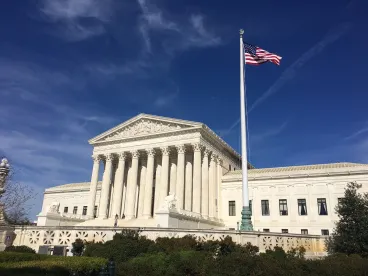In July 2020, the Supreme Court held in Barr v. Am. Ass’n Policitical Consultants, 140 S. Ct. 2335 (2020) that the TCPA’s government debt exception passed by Congress in 2015 rendered the statute an unconstitutional content-based restriction on free speech in violation of the First Amendment. To cure this constitutional infirmity, the Court severed the government debt exception from the TCPA. The Supreme Court’s holding in Barr left an open question over the validity of TCPA claims that had accrued between the time the government debt exception was enacted, and when it was severed from the statute (i.e. during the time the TCPA was operating as an impermissible content-based restriction on free speech). While severance may have prospectively solved the constitutional problem, the ability of this remedy to retrospectively cure the TCPA’s constitutional infirmity is less clear.
The first District Court to address this issue dismissed claims for TCPA violations occurring before the Supreme Court’s opinion in Barr on the basis that the statute was unconstitutional at the time the alleged TCPA violations occurred. Creasy v. Charter Commc'ns, Inc., No. CV 20-1199, 2020 WL 5761117, at *6 (E.D. La. Sept. 28, 2020). The Creasy case was followed quickly by a similar decision out of the Northern District of Ohio in Lindenbaum v. Realgy, LLC, No. 1:19 CV 2862, 2020 WL 6361915 (2020). In Lindenbaum, the District Court held that severance of the government-debt exception applied only prospectively, so the TCPA remained unconstitutional on its face from 2015 through entry of final judgment in Barr and thus could not be enforced against any alleged violator during this time.
However, District Courts quickly became split on the issue. Following the decisions in Creasy and Lindenbaum, several other courts held that defendants could still be held liable for TCPA violations that occurred prior to the severance of the government debt exception. See e.g. McCurley v. Royal Sea Cruises, Inc., No. 17-cv-00986-BAS-AGS, 2021 WL 288164 (S.D. Cal. Jan. 28, 2021); Shen v. Tricolor Cal. Auto Grp., LLC, No. CV 20-7419 PA (AGRx), 2020 WL 7705888 (C.D. Cal. Dec. 17, 2020); Abramson v. Federal Ins. Co., CV 8:19-2523, 2020 WL 7318953 (M.D. Fla. Dec. 11, 2020); Buchanan v. Sullivan, CV 8:20-301, 2020 WL 6381563, at *3 (D. Neb. Oct. 30, 2020); Burton v. Fundmerica, Inc., CV 8:19-119, 2020 WL 4504303, at *1 n.2 (D. Neb. Aug. 5, 2020).
At this time, there seems to be momentum in numbers favoring the view that TCPA violations that occurred prior to severance of the government debt exception are still actionable. However, the Lindenbaum case is currently on appeal to the Sixth Circuit, and the outcome of that appeal could either help cement, or reverse this momentum. Indeed, the appeal has generated significant amicus activity which reflects the importance of these proceedings. For example, a multistate coalition of attorneys general, including California Attorney General Xavier Becerra, have filed an amicus brief calling on the Sixth Circuit to reverse the district court’s ruling. According to this amicus briefing, “[g]ranting a five-year hall pass to these harassers would permit illegal activity and open the door for more.” The Sixth Circuit has set a briefing schedule in the Lindenbaum case that will have the appeal fully briefed by around May of 2021.
As we have seen with many issues related to the TCPA, there is a lack of consistency across jurisdictions in addressing the extent of the Supreme Court’s decision in Barr and the enforceability of the TCPA as a whole between 2015 and 2020. The Sixth Circuit’s opinion in Lindenbaum has the potential for significantly altering the trajectory of the TCPA’s newest legal issue, but as with most legal issues involving the TCPA, litigants will likely find themselves facing a fractured legal landscape. And while judge and jurisdiction will heavily influence the outcome of post-Barr challenges in such a landscape, defendants are for now still able to wield this potentially potent defense to TCPA claims that accrued before July 2020.




 />i
/>i
